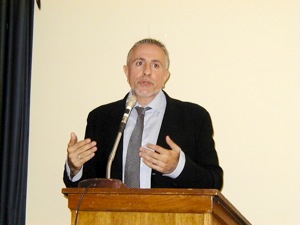-
- Sen. Craig files papers to withdraw guilty plea that stemmed from airport sex sting
- Coalition briefs Congress on meth, gays
- California Republicans wrestle with party values
- San Diego diocese to pay $198 million to settle 144 abuse claims
- Senate passes foreign aid bill easing abstinence restrictions
- Free condoms rejected over doubts about paper wrappers
- National News Briefs
- World News Briefs
national
Coalition briefs Congress on meth, gays
Published Thursday, 13-Sep-2007 in issue 1029
The National Coalition for LGBT Health held a congressional briefing on methamphetamine, mental health, and HIV in gay and bisexual men on Sept. 10, to encourage Congress to approve additional funding.
While there is no solid national data on the interplay of methamphetamine, mental health and HIV, a range of urban studies suggest that gay men are twice as likely to use crystal meth as the population at large, said Perry N. Halkitis, Ph.D., a researcher at New York University.
Halkitis conducted detailed interviews with men who work out at least three times a week and found that nearly 25 percent of them had used meth within the last six months. Most also reported use of cocaine, ecstasy, party drugs, and a lot of alcohol, either alone or in combination.
Halkitis’ 2007 study of black men in New York who have sex with men found they were spending $159 a month on crystal methamphetamine and a total of $775 on all substances of abuse each month.
Halkitis said that HIV-positive men are more likely to use meth. “They tell us over the years that methamphetamine provides them with a way to deal with their stigma for being gay and HIV-positive. It gives them energy. It is completely understandable why they would turn to this drug.”
Halkitis’ Project MASC – Meth and Social Cognition – found patterns of recreational use of methamphetamine on weekends. “But the neurological, emotional, psychological, and physical repercussions last longer than that. By the time you get some homeostasis [the meth loses its influence], it is time to start using the drug again,” Halkitis said, adding that the men “don’t believe they have a problem, they don’t want to go to an addiction facility, they are much more willing to come into a gay agency where they can work at a more holistic approach on their methamphetamine use.”
It is a “myth” that methamphetamine addiction is not treatable, said Elizabeth Disney, Ph.D., who works with Chase Brexton Health Services in Baltimore. Recovery rates are about the same as with cocaine and similar substances, Disney said.
Clinical trial data shows that Bupropion (Wellbutrin) reduces both the “high” of use and the craving of withdrawal associated with meth, and other pharmaceutical interventions show similar promise. “But none of them are silver-bullet, stand- alone interventions; they all have to be given in the context of behavioral treatment, learning how to change your life,” Disney said, citing, by way of example, UCLA’s Integrated Substance Abuse Programs, available at http://www.methamphetamine.org.
The Gay Men’s Health Crisis in New York developed “Hurricane Tina” in 2006. Bill Stackhouse, Ph.D., who heads the Institute for Gay Men’s Health, said community intervention aimed to reduce crystal meth use among young men who have sex with men, was funded in part by the city health department.
The intervention began with in-depth interviews with the target groups, Stackhouse said. They found that low self-esteem, curiosity about the drug, homophobia, isolation, the need for escapism, and coping with life were all driving use of crystal meth. Earlier campaigns in the city had stigmatized meth use and made it more difficult to initiate honest conversations about use of the drug.
Stackhouse said, “Primary prevention is most effective when multiple messages and approaches are utilized.” They created a program that blanketed targeted neighborhoods. It even included video public service announcements on DVDs to be shown in bars and clubs, and announcements on Internet Web sites like Manhunt. Evaluation of the program is underway.
Halkitis said use of and succumbing to methamphetamine is part of a life-long trajectory. “We need to better understand what is happening to kids in childhood and adolescence that is predisposing them to use drugs.”
“What we need from Congress is support for adequate resources to continue the programs that we now have, and to implement more. Meth knows no bounds.,” said Barbara Warren, an employee with the LGBT community Center in New York.
|
|
Copyright © 2003-2025 Uptown Publications


